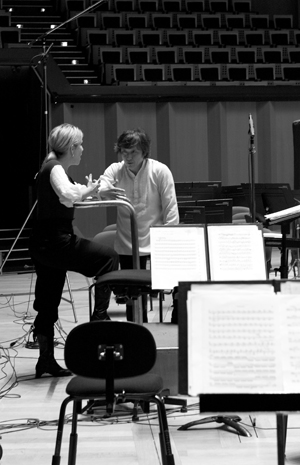Diva ~ Divo
*****”For sheer beauty of tone, legato that defies gravity and singing that restores your faith in human nature, listen last of all to what [she] does with Berlioz’s ‘D’amour l’ardente flame’. Diva or Divo, this is the real thing.”
“Divo then Diva […] this conceit is elegantly and intelligently played out by Joyce DiDonato. But skirts or britches, what really matters is the singing – and that’s superb. You revel at DiDonato’s attack in the cabaletta to Romeo’s aria […] marvel at the diamon bright coloratura in ‘Nacqui all’affano’ […] stand amazed at a pianissimo that seems to float on the air of its own volition at the end of Berlioz’s ‘Premiers transports’. For sheer beauty of tone, legato that defies gravity and singing that restores your faith in human nature, listen last of all to what [she] does with Berlioz’s ‘D’amour l’ardente flame’. Diva or Divo, this is the real thing.” *****
~ Christopher Cook BBC Magazine March 2011
“One of today’s most accomplished singers, American mezzo-soprano Joyce DiDonato, has it all: a warm, flexible voice that can be pert and spiky one moment and meltingly sweet the next. She has amazing facility in the rapid runs and turns of coloratura singing, a terrific trill, and the interpretive insight to breathe life into a wide range of characters and styles.
All of her talents are on vivid display in her new CD, titled “Diva, Divo”
Her ability to vary her sound to suit the mood is remarkable. As the love-struck adolescent Siebel in Gounod’s “Faust” she sounds bright and impetuous. As the abandoned Marguerite from Berlioz’s opera on the same subject, “Le Damnation de Faust,” her tone takes on a darker, melancholy coloring. The one real rarity in this collection is an aria from Massenet’s all-but-forgotten opera “Ariane.” It is followed by the final and most exciting excerpt of all — DiDonato as the Composer in the prologue to Richard Strauss’ “Ariadne auf Naxos,” a role she will sing at the Metropolitan Opera later this season.”
~ Mike Silverman, Associated Press February 2011
“The American mezzo Joyce DiDonato is exceptional in many ways, not least in managing to produce a popular yet independent-minded recital disc with a point beyond self-publicity … It’s playful, as well as an ideal vehicle for her glorious mezzo voice in which the most fiendish coloratura ornaments and trills sound effortless.”
~ Fiona Maddocks, The Guardian January 2011
“From literally the first note – an ecstatic F sharp over an arresting harmony which launches ‘Je suis gris!’ from Massenet’s Chérubin – this disc is a joy. Indeed, the luminous voice sounds splendid in everything she sings. [It] documents a major artist at the height of her powers and can hardly be recommended too warmly.”
~ George Loomis, The Classical Review February 2011
10/10
“Rosina’s “Contro un cor” is witty and showy, with some of the finest trills this side of Joan Sutherland and conspiratorial whisperings that make this seem as if it were recorded in performance. Her Roméo, from Bellini’s opera (again with Montvidas and baritone Nabil Suliman), is the perfect impetuous lad, with dark low notes, pointed diction, and strong rhythmic thrust. Cenerentola’s final rondo is taken at a fantastically breakneck speed and our Yankee Diva does not drop a note. It’s hard to believe it is the same singer who delivers Marguerite’s “D’amour l’ardente flamme”, with its pulsing anxiety contrasted with what she feels is absolutely true, if strange, love.
…suffice it to say that this CD gives enormous pleasure in rare as well as familiar repertoire. When embellishments are called for they are unhackneyed and perfectly in keeping with the composer’s style, and the mezzo invariably finds the right color for each portrayal. Perhaps the best thing about this recital is that everything DiDonato sings sounds spontaneous, as if the character–her- or himself–were actually experiencing it for the first time. Being an American, I’d like to chalk this up to her Yankee pluckiness, but it’s really something else: She’s a great artist.”
~ Robert Levine, Classics Today February 2011

One of the most important elements of a recording: the playback. It is here that we discover if our intended effect is succeeding, if we're finding the colors we wish, if the balance is correct, if the emotion is coming through. A great producer does much of this work for the artist, but the artist must also listen and evaluate.
“[DiDonato] is astounding. The recital opens with her in pants mode, as Massenet’s Chérubin gets drunk with an exuberance and passion that excite the “wow!” factor. Then DiDonato transforms into Mozart’s Susanna. Classical lyricism alternates with gushing romanticism and astonishing coloratura. The latter is dispensed on the two Rossini arias with a bel canto sensibility that allows for utmost flexibility of phrasing and tempo. (Conductor Kazushi Ono everywhere scores high marks.) […] This recital contains the 21st century’s counterpart to Golden Age vocalism, and includes a variety of repertoire that holds interest through an extremely generous 80 minutes. ~ Jason Victor Serinus San Francisco Classical Voice January 2012
